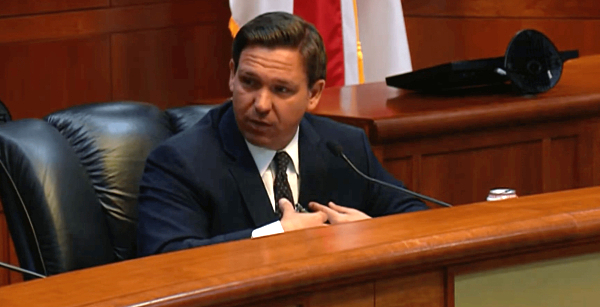
YouTube has purged a video of a panel discussion hosted by Florida Gov. Ron DeSantis with health experts from Oxford, Harvard and Stanford whose advice informed his decision to ease COVID-19 restrictions last year.
The Google-owned video platform didn’t like the fact that the experts thought children didn’t need to wear masks, reported The Wrap.
A YouTube representative said the position on masks violated YouTube’s “COVID-19 medical misinformation” policies.
The panel members at the forum in March were former White House coronvirus adviser Dr. Scott Atlas of Stanford University, Oxford epidemiologist Dr. Sunetra Gupta, Harvard professor Dr. Martin Kulldorff and Dr. Jay Bhattacharya of Stanford.
The clip was posted on YouTube by the American Institute for Economic Research, which has made the video available on its website.
The YouTube rep said the platform “has clear policies around COVID-19 medical misinformation to support the health and safety of our users.”
“We removed AIER’s video because it included content that contradicts the consensus of local and global health authorities regarding the efficacy of masks to prevent the spread of COVID-19,” the rep said. “We allow videos that otherwise violate our policies to remain on the platform if they contain sufficient educational, documentary, scientific, or artistic context. Our policies apply to everyone, and focus on content regardless of the speaker or channel.”
‘No scientific rationale’
The YouTube’s censors didn’t like an exchange in which Kulldorff, responding to a question by DeSantis, said “children should not wear face masks, no. ”
“They don’t need it for their own protection and they don’t need it for protecting other people, either,” the Harvard epidemiologist said.
Stanford’s Bhattacharya said it is “developmentally inappropriate” for children to wear masks and it “just doesn’t help on the disease spread.”
“I think it’s absolutely not the right thing to do,” he said.
Bhattacharya said that “if we went back a year, a lot of experts would say that wearing masks for the general public is not evidence-based.”
Later, Atlas said “there’s no scientific rationale or logic to have children wear masks in schools.”
The World Health Organization’s guidance says children age 5 and under don’t need to wear masks. It recommends that children between the ages of 6 and 11 wear them when they are in areas of “widespread transmission.” Children 12 and older “should wear a mask under the same conditions as adults,” when they are indoors or within three feet of someone with whom they are talking.
However, one year ago, on April 6, 2020, the WHO said the “wide use of masks by healthy people in the community setting is not supported by current evidence and carries uncertainties and critical risks.”
Just two months, later, however, as the pandemic surged, the WHO changed its stance without providing any evidence with randomized controlled trials.
On March 5, 2020, the Centers for Disease Control said masks “are usually not recommended in “non-health care settings.”
But on Aug. 7, the CDC said it “recommends that people wear masks in public settings and when around people who don’t live in your household, especially when other social distancing measures are difficult to maintain.”
The CDC’s prior stance on masks was once shared by White House coronavirus adviser Dr. Anthony Fauci, who said in a March 2020 “60 Minutes” interview that in general, “people should not be walking around with masks.”
“Right now in the United States, people should not be walking around with masks.
“You’re sure of it? Because people are listening really closely to this,” he was asked.
“There’s no reason to be walking around with a mask. When you’re in the middle of an outbreak, wearing a mask might make people feel a little bit better and it might even block a droplet, but it’s not providing the perfect protection that people think that it is. And, often, there are unintended consequences – people keep fiddling with the mask and they keep touching their face.”
Fauci since has insisted that he made the statement at the time because of the need to preserve a limited supply of masks for health-care professionals. But his rationale was science-based, consistent with the consensus prior to the coronavirus pandemic that the effectiveness of mask-wearing by the general public in slowing the spread of a virus like the novel coronavirus is unproven, and there’s evidence it does more harm than good.
The Association of American Physicians and Surgeons has compiled a page of “Mask Facts” that explains the basic science behind mask-wearing and summarizes a variety of studies.
‘Chilling’
The Wall Street Journal editorial board said it’s “chilling” that YouTube appears to be “systematically undermining the ability to access material in the public interest.”
Knowing what “officials and their advisers are saying” is “an essential democratic principle, and it’s as true for coronavirus response as any other policy challenge.”
YouTube purged an interview with Atlas last September, the Journal noted. In January, it censored a U.S. Senate committee hearing on cheap, available coronavirus treatments that have been shown to be effective around the world, including hydroxychoroquine and ivermectin.
The Journal noted that in the video is removed this week, DeSantis and the four panelists “lambaste the U.S. coronavirus response as excessively draconian and ineffective.”
“They emphasize unintended public-health harms from lockdowns and school closures, criticize mask mandates and generally celebrate Florida’s response.”
‘Age-targeted strategy’
Gupta, Kulldorff and Bhattacharya were part of a panel last September hosted by DeSantis that helped inform the governor’s COVID-19 policy, WND reported.
The three published a petition in October called The Great Barrington Declaration, which has been signed by nearly 14,000 medical and public health scientists.
It states that as “infectious disease epidemiologists and public health scientists we have grave concerns about the damaging physical and mental health impacts of the prevailing COVID-19 policies, and recommend an approach we call Focused Protection.”
Focused protection means allowing the healthy to go about their business while focusing on protecting the vulnerable.
In the panel discussion with DeSantis last September, they argued for the “age-targeted strategy,” contending lockdowns only make the pandemic worse.
Kulldorf insisted universities can hold in-person classes “almost normally” with very little risk, and there’s no need for testing on campus.
DeSantis asked the professor if locking down “society as a whole” actually could increase risk to the elderly population, noting the CDC indicates a survival rate of 99.997% for ages 0-19, 99.98% for 20-49, 99;95% for 50-69 and 94.6% for over 70.
Kulldorf said yes, contending that a total lockdown extends the time it takes to reach herd immunity.
“What helps the elderly is if the young take this very minimal risk and live normal life until there is herd immunity, and then when we have herd immunity, the older people can also live more normal lives,” he said.
The effectiveness of mask and social distancing mandates, testing and the role of herd immunity in stopping the spread also was discussed by the health experts.
Kulldorff argued that schools could reopen without enforcing mask-wearing, pointing out that in Sweden they remained open during the pandemic without masks.
Bhattacharya, who took part in an antibody study that concluded the number of COVID-19 infections is significantly higher than the estimates, said another lockdown in Florida “would be disastrous.”
“At this point, we know that the benefits of a lockdown are small,” he said.
“All they do is push cases off into the future; it doesn’t actually prevent the disease from happening. And the costs are absolutely catastrophic, enormous,” Bhattacharya said.
In fact, the White House and state and local governments back in March 2020 emphasized a strategy of “flattening the curve” or “slowing the spread.” That was assumed to mean spreading out the cases over time — not reducing them — so that the health care system would not be overwhelmed.
Bhattacharya emphasized the sharp difference in mortality rate for younger people, pointing out it’s lower than the seasonal flu.
A study by researchers at the University of Edinburgh in Scotland, WND reported last October, concluded “school closures and isolation of younger people would increase the total number of deaths, albeit postponed to a second and subsequent waves.”
Via Wnd


